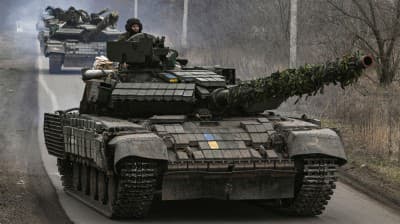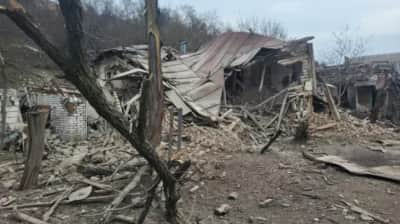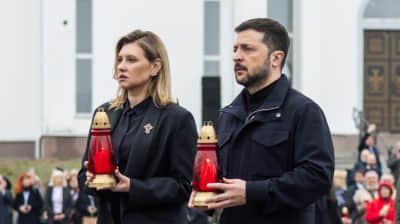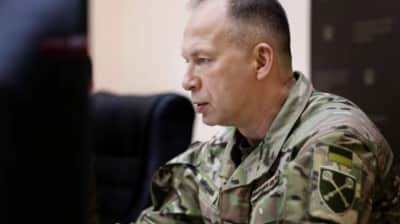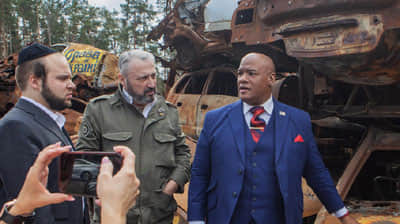ISW analyses Ukrainian Commander-in-Chief's essay on war in Ukraine

Experts at the Institute for the Study of War (ISW) have analysed an essay by General Valerii Zaluzhnyi, Commander-in-Chief of the Ukrainian Armed Forces, on the positional nature of the war in Ukraine.
Source: the ISW
Details: Ukrainian President Volodymyr Zelenskyy stressed that the war in Ukraine was not at a "stalemate", commenting on the essay by Zaluzhnyi.
During a joint press conference with European Commission President Ursula von der Leyen on 4 November, Zelenskyy said the current situation on the battlefield was "not a stalemate", even if "time has passed" and "people are tired".
Analysts say Zaluzhnyi's essay entitled Modern Positional Warfare and How to Win It provides a clearer outline of his thoughts on the changes Ukraine must undertake to overcome the current "positional" stage of the war than his interview with The Economist.
Zaluzhnyi believes the war "is gradually moving to a positional form", adding that in order to overcome positional warfare, Ukraine has to secure air superiority; break through minefields in depth; increase the effectiveness of counter-battery action; build and prepare the necessary reserves; and increase electronic warfare capabilities.
The report stated that Zaluzhnyi's essay was rather focused on explaining that the current positional nature of the war results from technological and tactical parity on the battlefield and the widespread use of minefields by Russian and Ukrainian forces.
Zaluzhnyi examined the opportunities that Ukraine faces from the challenges posed by Russia, including the significant losses among Russian aircraft, Ukraine's use of Western missile and artillery weapons, and Russia's inability to use its human mobilisation resources due to political, organisational and motivational problems.
The general concluded that positional warfare benefits Russia as it prolongs the war and may allow Russia to gain an advantage in certain areas.
Zaluzhnyi argued that either Ukraine or Russia might resume rapid manoeuvre warfare under favourable circumstances, and for Ukraine, this would include military resources provided by the West.
Analysts conclude that Zaluzhnyi's essay focused on how to restore manoeuvre in a positional war, not on the war reaching a deadlock.
To quote the ISW’s Key Takeaways on 4 November:
- Ukrainian President Volodymyr Zelenskyy emphasised that the war in Ukraine is not a "stalemate" in a comment to the media about Ukrainian Commander-in-Chief General Valerii Zaluzhnyi’s essay on the positional nature of warfare in Ukraine.
- Zelenskyy also denied Western reports that US and European officials are pressuring Ukrainian officials to discuss the possibility of peace negotiations.
- NBC added that US officials have no indication that Russian President Vladimir Putin is willing to negotiate with Ukraine or doubts that Russia can continue its war until Western aid for Ukraine falters.
- The Russian Ministry of Defence (MoD) allegedly used claims that the Syrian government agreed to supply weapons to Iranian-backed Lebanese Hezbollah to subsume remnants of the Wagner Group in Syria and seize their air defence systems.
- Russian forces conducted a series of missile and drone strikes against Ukraine on 3 and 4 November.
- Ukrainian forces continued offensive operations near Bakhmut and in western Zaporizhzhia Oblast on 4 November.
- The Russian government is testing an electronic voting system ahead of the 2024 presidential elections, likely to further support efforts to manipulate the results in favour of Russian President Vladimir Putin.
- Russian forces continued offensive operations along the Kupiansk-Svatove-Kreminna line, north and south of Bakhmut, around Avdiivka, west and southwest of Donetsk City, near Vuhledar, in the Donetsk-Zaporizhzhia Oblast border area, and in eastern and western Zaporizhzhia Oblast, and advanced in various sectors of the front.
- Russian authorities continue efforts to settle Russian citizens in occupied Ukraine.
Support UP or become our patron!

